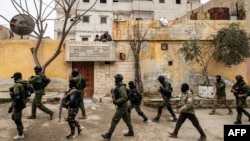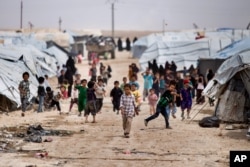Islamic State appears to be losing the ability to strike effectively in areas that were once part of the terror group's self-declared caliphate.
U.S. defense and military officials say they are seeing a "dramatic decrease" in IS activity and effectiveness across Iraq and Syria, with a noticeable decline in attacks during the just completed Muslim holy month of Ramadan.
"All aspects of ISIS that we are tracking continues to decline or degrade," the commander of the U.S.-led anti-IS mission, Major General Matthew McFarlane, told reporters Monday, using another acronym for the group.
This past Ramadan, normally a time when IS ramps up its attacks and activities, was "one of the most peaceful in years," he added.
According to the U.S.-led coalition, IS carried out 19 attacks in Iraq during Ramadan, an 80% decrease compared to last year and an 87% decline compared to 2020.
IS also managed 19 Ramadan attacks in Syria, a 37% drop from this time last year and a 70% decrease compared to 2020.
Most of the attacks, MacFarlane said, have been relatively small, opportunistic engagements.
"ISIS has failed to organize or coordinate anything more than that, over the past year," he said.
Intelligence from the United States and from several United Nations member states also seems to suggest the terror group is struggling.
Since early 2022, the U.S. and its partners have killed or captured at least 13 senior IS leaders in Iraq and Syria.
And some intelligence estimates indicate Islamic State is down to between 2,500 and 3,500 fighters in Iraq and Syria, a small fraction of the at least 34,000 fighters the group was thought to have commanded at its height between five and seven years ago.
But despite IS's shrinking numbers, some U.S. officials note there is reason for concern.
U.S. Central Command, which oversees U.S. forces in the Middle East and South Asia, launched an operation just last week that killed a senior IS official believed to have been planning attacks outside the Middle East.
A U.S. official who spoke to VOA on the condition of anonymity warned that the official is part of a new generation of IS leaders that has been undeterred by multiple setbacks, and which is still planning to expand the group's reach and to carry out external attacks.
Some researchers have also pointed to signs that IS may be positioning itself for a potential rebirth in Iraq and Syria.
In Syria, the terror group "has generally increased or maintained a higher tempo of attacks" since an initial jump in activity last August, according to an assessment earlier this month by the Counter Extremism Project, a New York and Berlin-based non-profit.
"There are increasingly many similarities between attacks over the past months and the period of initial ISIS expansion in late 2019 and early 2020," the CEP report added, though it cautioned the terror group appears to be increasingly focused on attacking civilians as opposed to security forces.
Officials and analysts also remain concerned that conditions in Syria, especially in the country's displaced persons camps, could set the stage for an IS resurgence.
The al-Hol camp in northeastern Syria, for example, holds an estimated 51,000 people, including more than 30,000 children.
"About 50% of the camp holds, espouses some form of [Islamic State] ideology," CENTCOM Commander, General Michael Kurilla, told U.S. lawmakers last month.
Other U.S. reports suggest al-Hol continues to serve as a financial hub for the terror group, with supporters finding ways to receive up to $20,000 a month while also smuggling funds to IS operatives outside the camp.
And for all the success in whittling away at IS's leadership and degrading its forces, U.S. officials also admit the group's core beliefs continue to resonate.
"The conditions that gave rise to ISIS have not been sufficiently addressed," Deputy Assistant Secretary of Defense Dana Stroul told reporters during a call Monday.
"The Daesh ideology remains unconstrained and active, seeking to reconstitute, resume their campaign of hate in this region and around the world," the coalition's Major General MacFarlane added, using the Arabic acronym for the terror group.






